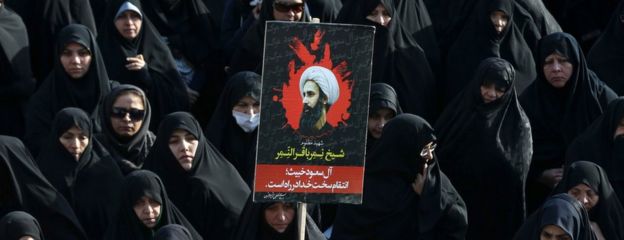Saudi coalition denies air strike on Iran's Yemen embassy
By BBC News
The Saudi-led coalition fighting Houthi rebels in Yemen has rejected Iran's accusation that its warplanes struck Tehran's embassy in the capital, Sanaa.
Iran vowed to complain to the UN, saying a rocket strike on Thursday had "seriously wounded a guard".The coalition said no operations had been conducted near the embassy.
Saudi Arabia recently cut ties with Iran after its embassy in Tehran was attacked by protesters angry at the Saudi execution of a key Shia cleric.
The regional rivals back opposing sides in Yemen - Sunni-ruled Saudi Arabia accuses Iran of supporting the Shia Houthis militarily. Tehran denies this.
More on Saudi-Iran tensions

Great rivalry explained: Why don't Iran and Saudi Arabia get along?
Spiralling tensions: Why crisis is "most dangerous for decades"
Sheikh Nimr al-Nimr: Who was leading Saudi Shia cleric?
A statement by the Saudi-led coalition on Thursday said Iran's allegations were "false and that no operations were carried out around the embassy or near to it".
It said its investigation "also confirms the embassy building is safe and has not been damaged".
Residents and witnesses in Sanaa had also earlier reported there was no damage to the main embassy building.
Iran's foreign ministry spokesman Hossein Jaber Ansari had accused Saudi Arabia of a "deliberate action" in "violation of all international conventions that protect diplomatic missions".
He spoke of damage to the building and injuries to staff.
Later, Deputy Foreign Minister Hossein Amir Abdollahian said: "During an air raid by Saudi Arabia against Sanaa, a rocket fell near our embassy and unfortunately one of our guards was seriously wounded."
He added: "We will inform the Security Council of the details of this attack."
Analysis: BBC security correspondent Frank Gardner
Ever since the Saudi-led air campaign began against Yemen's Houthi rebels last March, there was always a risk that the cold war between the region's two big rivals, Saudi Arabia and Iran, could ignite into something more serious.The Saudis accuse Iran of smuggling in arms by sea to equip the Shia Houthis, who retain control over the capital and much of the country. Saudi officials have even claimed that Iranian military commanders are on the ground there, helping to direct the Houthis.
Both Iran and the Houthis deny this. The reality is that the Houthis owe most of their military gains to support from renegade Yemeni army units loyal to ousted ex-President Ali Abdullah Saleh.
Saudi Arabia's military spokesman says its coalition has asked for precise co-ordinates of foreign embassies in the Yemeni capital so it can avoid hitting them. Angry as the Saudis are about the ransacking of their embassy in Tehran, it would have been a major escalation if they had carried out a deliberate, direct hit on Iran's embassy in retaliation.
It is not clear whether the Iranian embassy was fully functioning, but a number of countries have withdrawn their staff or relocated missions to the port city of Aden in the past year.
Although the incident may turn out to be less serious than initially feared, the BBC's Arab Affairs Editor Sebastian Usher says the growing row between Saudi Arabia and Iran could derail peace efforts in Syria and Iraq, as well as in Yemen.
The row began after Saudi Arabia executed Shia cleric, Nimr al-Nimr for "terrorism offences"
After the Saudi embassy was attacked, Saudi Arabia severed relations with Iran. A number of Saudi allies then followed suit in taking diplomatic action against Tehran.
Dire situation
At least 2,795 civilians have been killed in Yemen since March, when the Saudi-led coalition began a military campaign to restore the government and drive back the Houthis and allied security personnel loyal to ex-President Saleh.In the past six months, coalition and pro-government forces have retaken Aden, but the rebels still control the capital.
The already dire humanitarian situation has also deteriorated, with more than 21 million people - four-fifths of the population - now requiring aid.
Saudi Arabia and Iran - key figures
Population: Iran 81.8m; Saudi Arabia 27.7mGDP: Iran $416.5bn; Saudi Arabia $746.2bn
Export trade/year: Iran - Saudi Arabia $111m; Saudi Arabia - Iran $79.4m
Active army size: Iran 545,000; Saudi Arabia 233,500
Defence spending: Iran $6.3bn; Saudi Arabia $56bn
(Sources: CIA country guide, World Bank, the OEC, Global Firepower. Figures are for latest available year)
Nations who have now cut ties with Iran: Saudi Arabia, Bahrain, Sudan, Djibouti, Somalia
Nations who have taken other diplomatic measures against Iran: UAE (downgraded relations), Qatar, Kuwait (both recalled ambassadors)


0 Comments:
Post a Comment
Subscribe to Post Comments [Atom]
<< Home